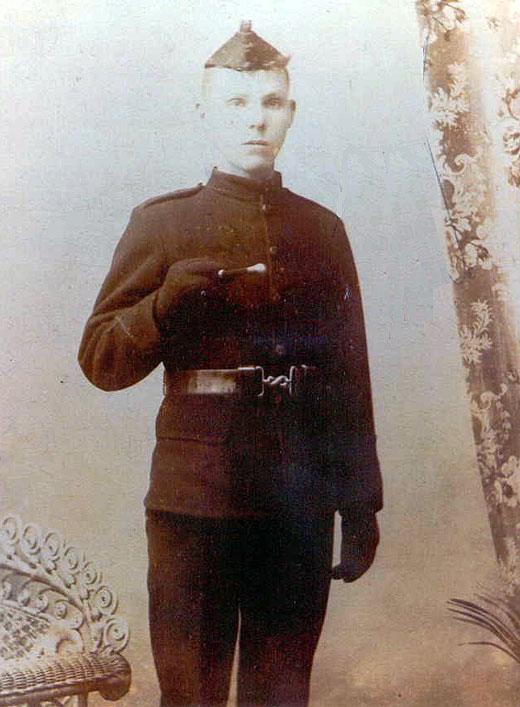Private Johnston Robinson

Johnston Robinson was born on 24 February 1879 at 12 Colchester Street, Belfast, the eighth or ninth or twelve children of labourer Johnston Robinson and his wife Mary Jane (née Harper).
On 1 November 1897 Robinson enlisted at Belfast in the Royal Irish Rifles (No.5372). The following year at Shorncliffe he was disciplined for three offences, being late falling in for route march, being drunk and disorderly and resisting the escort, and talking in the ranks.
Posted to the 2nd Battalion, he saw service in South Africa in the Boer War from 25 October 1899, returning to the UK on 5 February 1903. While in South Africa he was disciplined for a further seven offences, the most serious involving a court martial at Bushman's Hoek on 15 January 1900 for sleeping at his post. (He was awarded 14 days' Field Punishment No.1.) Two more offences followed at Dublin in 1903.
He was transferred to the Army Reserve on 31 October 1904, and was discharged on the completion of his twelve years' service on 31 October 1909. His military conduct was recorded as 'fair'. It was also noted that he could drive and ride, and understood the care of horses.
On 29 August 1905 Robinson married Elizabeth Watt in St John's Church of Ireland Church in Belfast. At the time he was working as a labourer and living at 12 Colchester Street. The couple had six children over the next twelve years. By the time of the 1911 Census they were living at 6 Wesley Street, Belfast, Johnston working as a van driver. They later moved to 7 Aughrim Street.
Robinson enlisted in the North Irish Horse at Belfast on 1 October 1914 (No.1247). He gave his age as 30 years (his true age was 35) and his trade as groom. At the time he was working for the Belfast Pure Ice Company of Great Victoria Street.
On 1 May 1915 he embarked for France with D Squadron, which at the time was serving as divisional cavalry to the 51st Division. Robinson was deprived of four days' pay on 29 May for being absent from parade. Four months later he was awarded 7 days' Field Punishment No.2 for being late for parade and insolent to an NCO.
In May 1916 D Squadron came together with A and E Squadrons to form the 1st North Irish Horse Regiment, serving as corps cavalry to VII then XIX Corps. On 9 August 1917 Robinson faced a court martial for neglect of duty, and making a false statement. Acquitted of the first charge but guilty of the second, he was awarded 10 days' Field Punishment No.1.
In August-September 1917 the 2nd North Irish Horse Regiment was disbanded and its men, together with some surplus to the needs of the 1st NIH Regiment, were transferred to the Royal Irish Fusiliers, an infantry regiment. Robinson was one of those chosen from the 1st Regiment, and on 4 September he was sent to the 36th Division Infantry Base Depot at Le Havre for training. There, however, he was found to be not physically fit for infantry service, and on 10 October 1917 he was transferred to the Labour Corps (No.380386) and posted to the 47th Labour Company.
On 5 March 1918 Robinson was deprived of 3 days' pay for being improperly dressed, not wearing his gas box respirator.
At the end of August 1918 Robinson was slightly wounded in the face. Treated at No.26 General Hospital at Etaples, he was able to return to his company on 22 September. On 29 December he was posted to the 159th Labour Company, remaining with that unit until he returned the the UK on 5 February 1919. On 7 March he was demobilised and transferred to Class Z Army Reserve, his military character recorded as 'good'.
Robinson claimed a pension for sciatica and rheumatism resulting from exposure while on duty, but a medical board in October 1919 found no disability.
In May 1920 Robinson emigrated to the United States, settling in New York. He died in the Bronx on 25 September 1953.
Image of Robinson serving with the Royal Irish Rifles sourced from Ancestry Public Member Trees, contributor Gordon Swenson.
